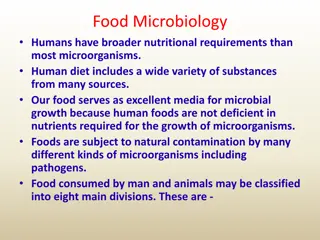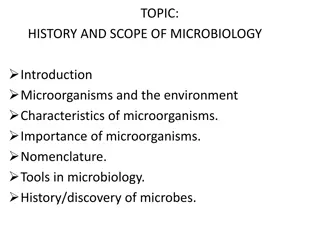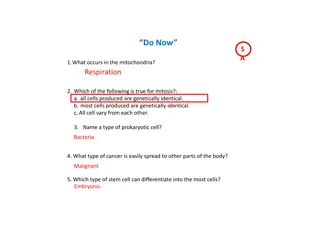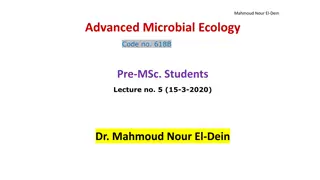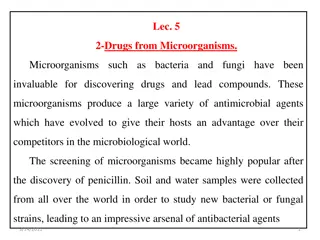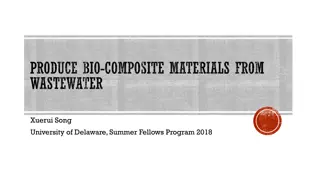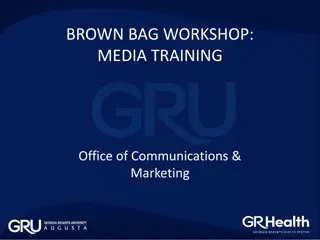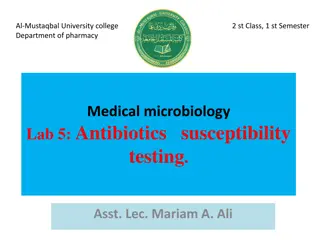Understanding Culture Media for Microorganisms
Culture media play a vital role in the growth and study of microorganisms. This content covers the primary ingredients required by all living organisms, types of culture media based on physical state, and specific media for bacteria and fungi. It explains the components and purposes of different types of media, such as Nutrient Agar, Potato Dextrose Agar, and Malt Extract Agar. The aim is to prepare solid and liquid media to support the growth of various microorganisms.
Download Presentation

Please find below an Image/Link to download the presentation.
The content on the website is provided AS IS for your information and personal use only. It may not be sold, licensed, or shared on other websites without obtaining consent from the author. Download presentation by click this link. If you encounter any issues during the download, it is possible that the publisher has removed the file from their server.
E N D
Presentation Transcript
Microorganisms need food to grow Primary ingredients required by all living organisms include: a carbon source, water, minerals, and a nitrogen source. These nutrients together make a media. Different microbes need different amounts of these nutrients.
TYPES OF CULTURE MEDIA : -Culture media can be classified according to: A -Physical state ( consistency ) of the media B. According to the use of media
A-Types of culture media based on the physical state Liquid medium: Without agar. for the proliferation of bacteria. Solid medium: 1.5-2.5% agar. for the isolation and identification of bacteria e.g., slant, Petri dishes/plates. Semisolid medium: 0.3-0.5% agar. for the observation of bacterial motility and preservation of bacteria.
B-Types of culture media According to the use of media 1)Simple or basal media: e.g. Nutrient Agar and Nutrient Broth. They are used for the cultivation of common microorganism 2)special-purpose media: e.g. enriched, selective, differential, transport, sensitivity test, etc ENRICHED MEDIA :-Simple media enriched with appropriate substance ,e.g. Blood ,glucose ,serum and ascetic fluid ,most commonly used to cultivate fastidious microorganism like streptococci.
: Culture Media for Bacteria NutrintAgar : A complex medium for the growth of heterotrophic bacteria : Components: -Pepton 5g -Beef extract 3g -Sodium chloride 8g -Agar 15g -Water 1 liter
: Culture Media for Fungi 1- Potato Dextrose Agar (PDA): It is a general purpose media for isolation of fungi and molds. Components: -Potatoes 200g -Agar 15-20g -Dextrose 15g -Distilled Water 1000ml
: Culture Media for Fungi 2-Malt Extract Agar (MEA): Components: -Malt Extract 20g -Agar 20g -Glucose 20g -Sucrose 200g -Distilled Water 1000ml
Aim To prepare solid and Liquid media
Requirement 1) Deffrent media : Nutreint broth - Nutrient agar - PDA/malt extract
Requirement 2- Balance 3- Distil water 5-Test tubes 6- Petri plates 7- Flasks 7- Burners 8-Autoclave
Procedure 1 1- - Weigh Weigh 2 2- - Dissolve Dissolve 3 3- - Sterilize Sterilize 4 4- - cool cool 5 5- - refrigerate till use refrigerate till use
1 1- - Weigh Weigh
2 2- - Dissolve Dissolve
3 3- - Sterilize Sterilize
5 5- - refrigerate till use refrigerate till use 4 4- - cool cool
Pouring of Solid media - Petri plates Remove the lid slightly Pour the media near bunsen burner Invert the plate Write date and time on the sides of plates :
In tubes - Making of Slants: After boiling, pour media in test tubes Autoclave Place in slant position till the media solidifies.
- Agar deep tube : After boiling, pour media in test tubes Autoclave Place in vertical position till the media solidifies.
-Making of test tubes with broth media : Place the test tube near a burner and remove the cap Pour the media in the tube and close the cap at once Place the tube in upright position in the test tube stand.
Video https://youtu.be/cneascR3OEc





